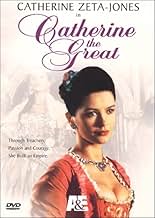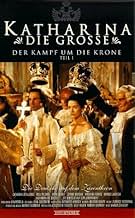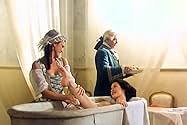Catherine the Great
- TV Movie
- 1995
- 1h 40m
IMDb RATING
6.1/10
1.4K
YOUR RATING
Trapped in a loveless arranged marriage to the immature future Czar, a young German Princess proves a skillful political infighter and rises to become Catherine the Great.Trapped in a loveless arranged marriage to the immature future Czar, a young German Princess proves a skillful political infighter and rises to become Catherine the Great.Trapped in a loveless arranged marriage to the immature future Czar, a young German Princess proves a skillful political infighter and rises to become Catherine the Great.
- Directors
- Writers
- Stars
- Awards
- 1 win total
- Directors
- Writers
- All cast & crew
- Production, box office & more at IMDbPro
Featured reviews
The Empress Elizabeth II rules mid-eighteenth century Russia. She marries her heir, the physically impotent German prince Peter, to the German princess, Catherine (Catherine Zeta-Jones). Catherine takes a lover, bears a child, plots against her husband and deposes him after he has reigned only six months. She becomes the Empress Catherine II. Well-educated and with liberal ideas, she is an astute politician and wages war with success. Yet when rebellion confronts her with the choice between fostering freedom and suppressing rebellion, she chooses suppression.
Catherine II was a fascinating and complex ruler, the period was crucial in determining the future course of Russia, its expansionary empire, its reactionary society and primitive economy. This film, however, addresses none of these great themes, except in the most cursory and superficial manner. It is a shallow drama of empty spectacle, in which intimate diversions are followed by unconvincing public events, battles and rebellions. The psychological characteristics of the protagonists, the motivations that drive them, the reasons for their decisions are all left unexplained. "There are great matters at stake", says Catherine to Potyomkin (Paul McGann), but we are never told what they are. Such rationalizations as do emerge involve the anachronistic importation of late twentieth-century western liberal concerns into eighteenth-century Russian society.
Television drama need not seem cheap. This film does. There is a good cast, but the dialogue is empty and its delivery perfunctory, although Ian Richardson's Vorontsov is done well and Brian Blessed is surprisingly well-moduated (and exceptionally quiet) as Bestuzhev. Generally, the cast seems dispirited by the trite, thin, lines they are asked to utter. One hundred minutes spent watching Miss Zeta-Jones will always have its rewards. None the less, she is miscast. Most particularly, her voice is in its nature contemporary and middle class, with its very modern inability correctly to pronounce the letter 'r'; it is unsuitable to the role of an eighteenth century aristocrat and Empress. The set pieces are sparse and unconvincing and the direction humdrum.
The story and this cast deserved better than this slight spectacle.
Catherine II was a fascinating and complex ruler, the period was crucial in determining the future course of Russia, its expansionary empire, its reactionary society and primitive economy. This film, however, addresses none of these great themes, except in the most cursory and superficial manner. It is a shallow drama of empty spectacle, in which intimate diversions are followed by unconvincing public events, battles and rebellions. The psychological characteristics of the protagonists, the motivations that drive them, the reasons for their decisions are all left unexplained. "There are great matters at stake", says Catherine to Potyomkin (Paul McGann), but we are never told what they are. Such rationalizations as do emerge involve the anachronistic importation of late twentieth-century western liberal concerns into eighteenth-century Russian society.
Television drama need not seem cheap. This film does. There is a good cast, but the dialogue is empty and its delivery perfunctory, although Ian Richardson's Vorontsov is done well and Brian Blessed is surprisingly well-moduated (and exceptionally quiet) as Bestuzhev. Generally, the cast seems dispirited by the trite, thin, lines they are asked to utter. One hundred minutes spent watching Miss Zeta-Jones will always have its rewards. None the less, she is miscast. Most particularly, her voice is in its nature contemporary and middle class, with its very modern inability correctly to pronounce the letter 'r'; it is unsuitable to the role of an eighteenth century aristocrat and Empress. The set pieces are sparse and unconvincing and the direction humdrum.
The story and this cast deserved better than this slight spectacle.
Once again, A&E brings us a beautiful looking production. The costumes, sets and, of course, performances by an exceptional cast, are stunning as always. However it seems that the writers were getting a bit tired while working on this one. It lacked the cleverness and vivacity of productions such as Vanity Fair and Pride and Prejudice, and the drama we enjoyed in Horatio and Tess. I was also disappointed to find that the version available in N.America is only 90 minutes long, and includes only Catherine's early reign. If you want to see the entire production you apparently need to get the 3-hour version, available in Germany.
All in all, it is worth watching, if only for the visuals and wonderful acting. Catherine Zeta Jones is brilliant and displays her versatility in this dramatic role. I cannot begin to comment on the equally strong performances of the rest of the cast, being restricted to 1000 characters here, but as I say, certainly worth the watch.
All in all, it is worth watching, if only for the visuals and wonderful acting. Catherine Zeta Jones is brilliant and displays her versatility in this dramatic role. I cannot begin to comment on the equally strong performances of the rest of the cast, being restricted to 1000 characters here, but as I say, certainly worth the watch.
This historical drama has a most interesting story. Catherine The Great was a powerful women and she brought Russia into the modern age.
Catherine Zeta-Jones is terrific in this film. She plays the part well expressing the independence and greatfulness of Catherine The Great. Highly recommended.
Catherine Zeta-Jones is terrific in this film. She plays the part well expressing the independence and greatfulness of Catherine The Great. Highly recommended.
Although fairly interesting to watch, Katharina is very historically inaccurate and biased, which is partly due to the horrible miscasting. Just to name a few: 1. Catherine Zeta-Jones as Empress Catherine II: a actress who is young, beautiful, dark in complexion and extremely attractive is certainly a poor choice to play a pale, plain middle-aged nimphomaniac. No one would ever address the real Catherine II as "you pretty thing", as Pugachev did in the film! 2. Jeanne Moreau as Empress Elizabeth: a 70-year old playing a 40-year old (I think this is self-explanatory) 3. Omar Sharif as Count Razumovsky: a 65-year old with a typically mediterranean appearance as a 45-year-old Ukrainian... 4. Rhys-Meyers as Pugachev... Don't know where to start... Apart from the fact that the actor is once again much older that his character, Rhys-Meyers is a BAD choice to play a violent, charismatic, almost demonic, and at the same time very folkish, Emelian Pugachev. Rhys-Meyers just doesn't look like an escaped convict-mass-murdered-highway robber-impostor or any of what real-life Pugachev was. Apart from that, a particularly striking misportrayal is the execution of Pugachev. The filmmakers have it take place in the summer in front of a crowd of about 5, while in reality it took place in the middle of winter on the Red Square in Moscow in front of a crowd of perhaps a 100,000, and was an extremely dramatic event, one the biggest public spectacles in Russia's history. So much for the fillmakers... Also, the story of Catherine's marriage to Peter III is portarayed in a highly prejudiced manner, drawing an all-too-clear line between the supposedly "good guys" (namely Catherine, Orlov, and the bunch) an the "horrible monster" Peter III. The story was not nearly so black-and-white in reality. Apart from that, the film makes fairly decent viewing. Balancing the two, I give it a 6/10
I'll have to admit at the out-set, here, that I know very little about Russian history. That being said, I was expecting a great deal more from this movie than was given. Catherine was purportedly a visionary that changed Russian society by instituting laws that helped the poor and was a patron of the arts. We saw none of that in this move, only a person driven by ruthless ambition.
I thought that toward the end of the move we would begin to see some philosophy or ethics form part of her character, but this was not to be. When she allowed her political opponent to be executed at the end of the film, a man both brave and righteous, the movie fell apart. A shame.
I thought that toward the end of the move we would begin to see some philosophy or ethics form part of her character, but this was not to be. When she allowed her political opponent to be executed at the end of the film, a man both brave and righteous, the movie fell apart. A shame.
Did you know
- TriviaJeanne Moreau (Elizabeth) played Catherine in Great Catherine (1969).
- GoofsWhen Catherine trades in her virginity to get pregnant, the skin of her mate's back and legs is tanned, while his buttocks are perfectly white. There were neither sunbathing nor a pair of trunks in 18th century.
- Alternate versionsApprox. 80 minutes were deleted from the US version by A&E compared to the original German version which was shown in 2 parts a 90 minutes.
- ConnectionsFeatured in Neighbours: A 10th Anniversary Celebration (1995)
Details
- Release date
- Countries of origin
- Language
- Also known as
- Catalina la Grande
- Filming locations
- Production companies
- See more company credits at IMDbPro
- Runtime1 hour 40 minutes
- Sound mix
- Aspect ratio
- 1.33 : 1
Contribute to this page
Suggest an edit or add missing content






































